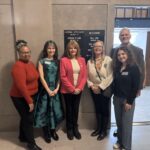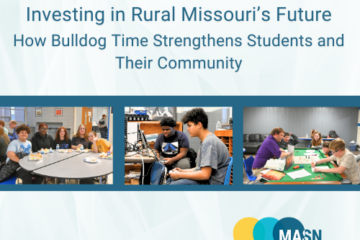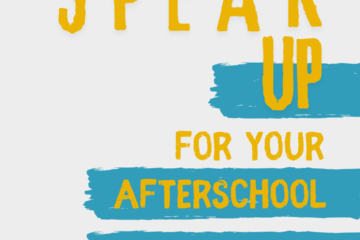




By: Cristal Sanchez
As soon as Maria Bohannon opens the doors of the ACE afterschool program, she is ready to make connections with those who may feel unconnected.
“The intention is ‘how is your day’,” she says, “‘I want to know about you’, ‘Tell me about you’.”
Maria is the director of an afterschool program for justice-system-involved youth. She is an outstanding example of how afterschool programs foster a space for youth dealing with mental health issues.
One of the many she remembers fondly is her connection with Christopher.
Christopher was in the foster system, struggling with feelings of belonging and had a need to be in a safe space where he could feel loved.
Maria traditionally bakes a birthday cake for all her youth to celebrate their big day. When it was Christopher’s birthday and she presented him a home-baked cake, his reaction was a testament to the power of afterschool.
“He turns around and I said, ‘Happy birthday’, and everybody started singing ‘Happy Birthday’, Maria said. “And he sat on the floor and started to cry.”
Maria naturally asks him “Buddy. What’s the matter?”
“Miss Maria, you made me a cake,” replied Christopher.
Maria’s cake was Christopher’s first birthday cake. It was his 17th birthday.
Christopher joined the Marine Corps and is now an officer with this Missouri State Highway Patrol.
Maria’s afterschool program, like other Missouri afterschool programs, provide youth with a different type of support needed during the hours between 3pm to 5pm. The connections that youth forge with caring adults and peers in their afterschool programs are an antidote for mental health disorders, protecting them from substance use, violence and social media harms.
This past Wednesday, we spent time at the capitol with a group of afterschool ambassadors to inform our state leaders on the importance of afterschool to the wellbeing of youth all across Missouri.
We were greeted with open arms from various legislators, including Rep. Burt Whaley.
“The idea of an afterschool program, for me, is that you create a safe environment, you create a learning environment, you create an affiliation,” Rep. Whaley said.
Whaley’s educational background in working with youth at an alternative school shows his passion and commitment to support programs that build up the wellbeing of youth. At his school, Whaley not only received a grant to employ a therapist, but also a social worker and a trauma-enforced officer.
“We kept seeing issues that we just did not have the capabilities of dealing with and were losing these kids because we didn’t have the resources,” Rep Whaley said, “and so we slowly started to gain resources.”
As part of the Health and Mental Health committee, the representative says he hopes to advocate for trauma-informed training in afterschool programs. He says he sees it as a vital step in ensuring the well-being of youth and to keep them out of trouble.
65,000 Missouri adolescents (13.4% of the population ages 12-17) needed treatment for substance use disorders in 2022. Afterschool programs discourage youth from such use.
Studies show that participants in afterschool programs at least two days a week were 18% less likely to use alcohol and 39% less likely to use marijuana.
In addition to keeping youth away from troubling activities, mental health resources available in afterschool programs are also important because the time spent fostering meaningful connections with other youth and afterschool staff matters.
Studies show that at least one in three youth in Missouri aged 9–17 have a diagnosable mental health disorder. Some of these disorders can be traced to the rampant use of social media among youth.
Michaela Flores, program director at Columbia Housing Authority Moving Ahead, sees the positive impact she creates as a mentor for her youth.
“There is a concerning increase in anxiety, depression, social isolation, poor sleep patterns, and decreased self-esteem in our youth due to excess exposure of social media,” Michaela said, “our program tries to combat this by creating a safe space where students can learn pro-social behaviors and have a sense of belonging!.”
One of her 9th graders who deals with attention-deficit/hyperactivity disorder, has felt the support of Michaela and other afterschool staff.
“Moving Ahead helps me talk about my problems with the teachers or in small group time where we talk about my feelings. It makes me feel stronger about myself knowing I’m not the only one with these problems,” the 9th grader said.
Another study indicates children and adolescents who spend more than 3 hours a day on social media face double the risk of mental health problems including experiencing symptoms of depression and anxiety. Afterschool programs support youth with these experiences.
An 8th grader from the Moving Ahead program battling with depression due to the loss of a loved one, sought their afterschool program as a safe space.
“I enjoy attending my afterschool program because of how free you can be about how you feel and how I can communicate the issues going on with my life.”
And it’s not just youth who benefit from after school programs that can keep them away from screens, it’s the working parents whose stress level decreases knowing their youth are safe.
Rep. Tony Harbison, who is also a member of the Health and Mental Health Committee, says that representing area where financial needs are great, after school programs are greatly appreciated.
The policy committee alongside the Missouri AfterSchool Network thank our Missouri legislators for assisting us as we work to make sure youth feel their best, so they become positive members of our society.



